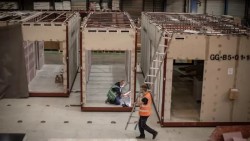Offsite modular manufacturing seen as the solution to sector's productivity problem.
At a factory in Bedford, north of the British capital, a series of boxlike apartments - including kitchen bench tops, ovens, baths and sinks - are slowly moving along the production line.
Specialised teams of workers finish the electrics, plumbing and painting, while at the end of the row the apartments are showroom ready. All they need is furniture.
In February the units will be driven to the south London suburb of Croydon and stacked on top of each other to form the tallest modular buildings in the world: two build-to-rent towers of 38 and 44 stories. Built by Tide Construction, a privately owned contractor and developer, they will be completed in half the usual time, and within budget.
This model of offsite manufacturing is increasingly seen as the solution to the construction industry's stubbornly poor productivity record, which - unlike other sectors - has barely changed over the past two decades. Productivity growth in UK construction has averaged just 0.4 per cent per year, compared with 3.2 per cent in manufacturing, according to the Office for National Statistics.
"The construction industry is one of the last to embrace modernisation," said Mark Farmer, head of Cast Consultancy, which has been advising the British government on its construction strategy. "While we are all using smartphones, construction is still pretty much the same as it was during Roman times."
Technology giants eye sector
That may be about to change. Mark Bryden, chief executive of Bryden Wood, an architectural consultancy advising the Greater London Authority on its house building programme, said construction is ready for its "Uber moment" - or disruption by new technologies.
Technology giants such as Amazon and Google are already circling the industry, with the online retailer buying a flat-pack housebuilder in California last month and Google's parent company, Alphabet, buying factory-made homes for employees and launching a development project in Toronto through a subsidiary, Sidewalk Labs.
Productivity in the industry has been hampered by the bespoke nature of most construction projects, leaving contractors starting from scratch each time, Mr Bryden said. Components such as floors, walls, cladding and electrical systems could be made to a standard model - much like Ikea, the Swedish flat-pack furniture store, uses just five or six standardised joints to produce thousands of products.
"At the moment the construction industry consistently protects its intellectual property and nearly everything is produced bespoke," said Mr Bryden. "If standardised components were manufactured, we wouldn't be wasting money by designing specific products to do specific jobs; we would have generic products, keeping costs down and improving quality across the board."
Traditional suppliers are also embracing technology. Wienerberger AG, the largest brick maker in the world, is planning to use robots as bricklayers on some of its European sites after it agreed a partnership with Fast Brick Robotics, an Australian company.
"The improvements to productivity are enormous because the robot can work around the clock, and it's higher quality as it's not vulnerable to human failure," said Heimo Scheuch, chief executive of Wienerberger.
The fragmentation of the construction industry has held it back, he added. Many builders are either small businesses or self-employed, so lack the capital to invest in equipment, or the incentives to train and upgrade their workers.
Noble Francis, economics director at the Construction Products Association, agreed. The volatility of the construction sector has also made contractors "reluctant to take on fixed costs such as permanent labour or a factory", Mr Francis said.
In Japan, companies such as Toyota factory-produce homes in large numbers in a model closer to motor manufacturing. But there are key differences with the UK, added Mr Francis. Japan has a bigger population, a more stable housing market and a willingness to knock down old homes and replace them with new ones, which means they build almost 1m homes each year, he said.
Still, most construction experts believe solutions to the industry's lagging productivity will be found offsite. Nine out of 10 buildings worldwide run over budget and the average cost overrun is 51 per cent, said Bent Flyvbjerg, professor of construction at Saïd Business School. "The construction site has to become an assembly-site," he said. "Until this happens, construction will be stuck in the Stone Ages as regards productivity."
Is Britain on the brink of a modular revolution?
John Fleming, founder and chairman of Tide Construction, is convinced that Britain is on the brink of a modular revolution, predicting that 30 to 40 per cent of construction will be built offsite within the decade. In Croydon, the towers are due to open in the first quarter of 2020. Tide has "a good few more" in the pipeline, Mr Fleming said.
The 210 workers at the company's Bedford factory are more productive than they would be on a construction site because the workshop is fully lit and heated to 15 degrees. In addition, "everything is at ground level and it's much easier to supervise someone at floor level than 20 storeys up on their own", Mr Fleming said.
UK productivity crisis
How a lack of skilled building workers is stunting UK growth
The offsite model not only halves the build time but leads to an 80 per cent reduction in waste, encourages a 95 per cent recycling rate, and produces higher quality buildings because it's "easier to impose strict controls on the factory floor than on a building site", he said.
Factory methods can be used for "everything that conventional methods can be used for", said Mr Fleming.
Original link - FT









